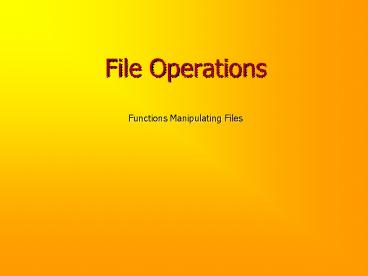File Operations - PowerPoint PPT Presentation
1 / 16
Title:
File Operations
Description:
One way to guarantee both conditions: the ifstream is open. the file was specified by the user ... peek at, or unget chars from a stream. skip over chars in a stream. ... – PowerPoint PPT presentation
Number of Views:29
Avg rating:3.0/5.0
Title: File Operations
1
File Operations
Functions Manipulating Files
2
Problem 1
- Using OCD, design and implement a function that
reads the name of an input file from the user,
tries to open it, and returns to the caller an
ifstream guaranteed to be open, and guaranteed to
be connected to a file specified by the user.
3
- One way to guarantee both conditions
- the ifstream is open
- the file was specified by the user
- is to use a loop that gives the user another
chance if they enter an invalid file name...
4
Behavior
- Our function should display a prompt for the name
of the input file. It should read the name of
the input file. It should try to open an
ifstream to that file. If the ifstream opens
successfully, our function should return that
ifstream otherwise, it should display an error
message, loop back and give the user another
chance.
5
Objects
- Description Type Movement Name
prompt string local --
file name string in (kbd) fileName
connection ifstream out fin
error msg string local --
6
Operations
- Description Predefined? Library?
Name
display a string yes string ltlt
read a string yes string gtgt
open connection yes fstream -- to
a file
verify connection yes fstream is_open
repeat on failure yes built-in loop
return an ifstream yes built-in return
7
Algorithm
- 1. Loop
- a. Display prompt for input file name.
- b. Read fileName.
- c. Open ifstream connection named fin to
fileName. - d. If fin opened successfully, return fin.
- e. Display error message
- End loop.
8
- If we wish to avoid declaring fin within the
loop, we need a way to open fin at a point
different from its declaration. - The ifstream (and ofstream) classes provide the
function member open() to open a stream at a
point other than its declaration.
9
Coding
- / GetIFStream()
- ...
- /
- ifstream GetIFStream()
- ifstream fin // declare fin
here - string fileName
- for ()
- cout ltlt \nEnter the name of the input file
- cin gtgt fileName
- fin.open(fileName.data()) // open fin
here - if (fin.is_open()) return fin // verify it
opened - cout ltlt \n Unable to open file \
10
Status Operations
- To determine the status of a stream, the
libraries provide these function members - good() // returns true iff stream is ok
- bad() // returns true iff stream is not ok
- fail() // returns true iff last operation
failed - eof() // returns true iff last file-read
failed
11
Change-State Operations
- To change the state of a stream, the libraries
provide these function members - clear() // reset status to good
- setstate(b) // set state bit b (one of
- ios_basegoodbit,
- ios_basebadbit,
- ios_basefailbit, or
- ios_baseeofbit).
12
Read-Position Operations
- To manipulate the read-position within an
ifstream, the libraries provide these - tellg() // returns offset of
current - read-position from
- beginning of file
- seekg(offset, base) // move read-position
- offset bytes from base
- (one of ios_basebeg,
- ios_basecur, or
- ios_baseend)
13
Write-Position Operations
- To manipulate the write-position within an
ofstream, the libraries provide these - tellp() // returns offset of
current - write-position from
- beginning of file
- seekp(offset, base) // move write-position
- offset bytes from base
- (one of ios_basebeg,
- ios_basecur, or
- ios_baseend)
14
Other Operations
- To look at the next character in an ifstream
without advancing the read-position (i.e.,
without reading it), the libraries provide - peek() // returns next char in the
- stream without reading it
- To unread the last char that was read, the
libraries provide - unget() // unread char most recently read
15
Another Operation
- To skip a given number of chars in the stream (or
until a particular char is encountered), the
libraries provide - ignore(n, stopChar) // skip past n chars,
- or until stopChar
- is encountered
16
Summary
- The C iostream library provides a rich set of
I/O functions that let a programmer - open and close streams.
- read-from/write-to streams.
- get/set the state of a stream.
- get the read/write position of a stream.
- move the read/write position of a stream.
- peek at, or unget chars from a stream.
- skip over chars in a stream.

